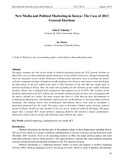New Media and Political Marketing in Kenya: The Case of 2013 General Elections
Abstract
The paper examines the role of new media in political marketing during the 2013 general elections in Kenya.The ways in which politicians market themselves in the political realm have changed dramatically since the emergence of new media. Politicians in Kenya found innovative ways of reaching the masses with their campaign messages through new media platforms. It is however interesting to note that despite the high energy in the new media scene, there is little literature on the role that new media plays in political marketing in Kenya. Thus, the study aims at finding out the relevance of new media in Kenyan elections. Kenya has a national policy framework that supports access to ICTs. The creation of the backbone infrastructure for ICT in Kenya has potentially opened up space for new ways of engaging with the masses through new media. The paper argues that there is a link between these developments in technological infrastructure, and ultimately improved access of the Internet, to increased online political marketing. The framing theory and technological determinism theory were used to formulate a theoretical framework for the study. The paper seeks to determine whether going forward, political parties in Kenya should give due attention to the use of new media for political marketing. The paper argues that a stronger ICT –based political campaign platform will entrench a deeper participatory, democratic culture which is in line with achieving vision 2030 for the country.
URI
https://www.researchgate.net/publication/316189367_New_Media_and_Political_Marketing_in_Kenya_The_Case_of_2013_General_Electionshttps://www.ijac.org.uk/images/frontImages/gallery/Vol._3_No._6/7.pdf
https://www.semanticscholar.org/paper/New-Media-and-Political-Marketing-in-Kenya%3A-The-of-Ndavula-Mueni/52331f8582da552cfee2d10bff65980e728c8148
http://hdl.handle.net/123456789/4519

